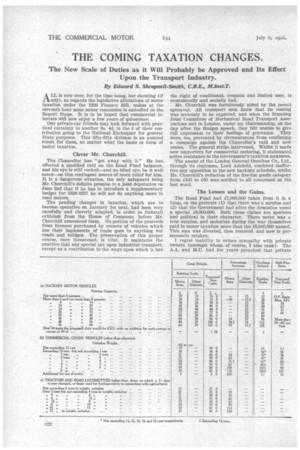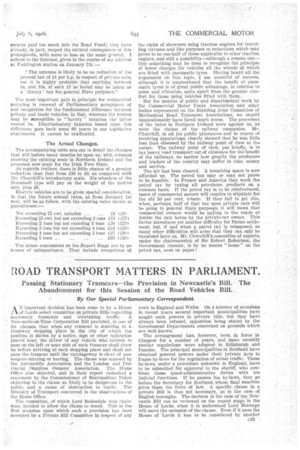THE COMING TAXATION CHANGES.
Page 12

Page 13

If you've noticed an error in this article please click here to report it so we can fix it.
The New Scale of Duties as it Will Probably be Approved and Its Effect Upon the Transport Industry.
By Edward S. Shrapnel-Smith, C.13.E.,
Ais now over, for the time being, bar shouting (if IL any), as regards the legislative alterations of motor taxation under the 1926 Finance Bill, unless at the eleventh hour some minor concession is embodied on the Report Stage. It is to be hoped that commercial interests will now enjoy a few years of quiescence.
Our private-car friends may look forward with practical certainty to another Ss. 4d. in the of their contribution going to the National Exchequer for general State purposes. This fifty-fifty division is an assured result for them, no matter what the basis or form of motor taxation.
Clever Mr. Churchill.
The Chancellor has "got away with it." He has effected a modified raid on the Road Fund balances, and his eye is still cocked—and no blind eye, be it well noted—on this contingent source of more relief for him. It is a dangerous situation, the only safeguard being Mr. Churchill's definite promise to a joint deputation on June 2nd that if he has to introduce a supplementary budget for 1926-1927 he will not do anything more to road motors.
The pending changes in taxation, which are to become operative on January 1st next, had been very carefully and cleverly adapted, in order to forestall criticism from the House of Commons, before Mr. Churchill announced them. No portion of the proceeds from licences purchased by owners of vehicles which are their implements of trade goes to anything hut roads and bridges. The preservation of this proper course, once threatened, is vital. It maintains the prattice that any special tax upon industrial transport, except as a contribution to the ways upon which it has the right of conditional, common and limited user, is economically and socially bad.
Mr. Churchill was fortuitously aided by the recent upheaval. All transport men knew that its coming was seriously to be expected, and, when the Standing Joint Committee of Mechanical Road Transport Associations met in London, under my chairmanship, on the day after the Budget speech, they felt unable to give full expression to their feelings of grievance. They were, too, prevented by circumstances from continuing a campaign against the Chancellor's raid and new scales, The general strike intervened. Whilst it made new supporters for commercial motoring, it stalemated active resistance to the Government's taxation measures.
The assent of the London General Omnibus Co., Ltd., through its chairman, Lord Astifield, rendered ineffective any opposition to the new hackney schedule, whilst Mr. Churchill's reduction of the five-ton goods category from £105 to £60 was notified to all concerned as the last word.
The Losses and the Gains.
The Road Fund had £7,000,000 taken from it in a lump, on the pretexts (1) that there was a surplus and (2) that the Government had after the Armistice voted a special £8,000,000. Both these claims are specious and political in their character. There never was a true surplus, and motorists during the war themselves paid in motor taxation more than the £8,000,000 named. This sum was diverted, then restored, and now is permanently retaken.
I regret inability to evince sympathy with private owners (amongst whom, of course, I also rank). The A.A. and NUT. had for years preached that private
owners paid too much into the Road Fund ; they have . already, in part, reaped the natural consequence of this propaganda, with more to lose on the same ground. I adhere to the forecast, given in the course of my address at Paddington station on January 7th "The outcome is likely to be no reduction of the present tax of £1 per h.p: in--respect of private cars, but it is highly ,prohable that anything between 5s. and 10s. of each £1 so levied may be taken as a 'luxury' tax for general State purposes."
The most important gain in principle for commercial motoring is renewal of Parliamentary acceptance of and recognition for the fundamental difference between .private and trade vehicles, in that, whereas the former may be 'ainceptible to "luxury" taxation the latter cannot be. Discriminatory taxation based upon this difference goes back some 60 years in our legislative enactments. It cannot be eradicated.
The Actual Changes.
The accompanying table sets out in detail .the changes that will before many months be upon us, with columns allowing the existing scale in Northern Ireland and the proposed new scale for the Irish Free State.
As regards trailers, 'there is little chance of a greater reduction than that from £10 to £6, aS compared with Mr. Churchill's introductory scale. Six-wheelers of the Scammell type will pay on the weight of the motive unit, plus £6.
Electric vehicles are to be giVen special consideration, in that the future annual rates, aS from January 1st next, will be as follow, with the existing rates shown in parentheses the claim of showmen using traction engines for travelhug circuses and like purposes to reductions which may prove to be one-half of those applicable to other traction engines, and still a possibility—although a remote one—. that something may be done to recognize the principle of lower charges for vehicles all the wheels of which are fitted with pneumatic tyres. Having heard all the arguments on this topic, I am doubtful of success, although it is unquestioned that the benefit of pneumatic tyres is of great public advantage, in relation to noise and vibration, quite apart from the greater comfort for those using vehicles fitted with them.
But for months of public and departmental work by the Commercial Motor Users Association and other bodies represented on the Standing Joint Committee of Mechanical Road Transport Associations, we should unquestionably have fared much worse. The precedent of the rates in Northern Ireland were against us, as were the claims of the railway companies. Mr. ,Churchill, in all his public utterances and in course of receiving deputations, clearly showed that he was little less than obsessed by the railway point of view at the outset. The railway point of view, put briefly, is to tax heavy road transport out of ekistence for the benefit of the railways, no matter how greatly the producers and traders of the country may suffer in time, money and service.
The air has been cleared. 'A breathing space is now afforded us. The petrol tax may or may not prove to be feasible. In France and America they work the petrol tax by taxing all petroleum products en a common basis. If the petrol tax is to be reintroduced, users of commercial motors will require to stipulate for the old 50 per cent. rebate. If they fail to get this, when, perhaps, half of that tax upon private cars will be going to general State purposp, it will mean that commercial owners would be paying to the roads at double the rate borne by the private-car owner. This factor introduces yet another difficulty for future settlement, but, if and when a petrol tax is reimposed, so many other difficulties will arise that they can only be examined later on. Mr. Churchill's committee of experts, under the chairmanship of Sir Robert Robertson, the Government chemist, is by no means " home" on the petrol tax, even on paper 1
















































